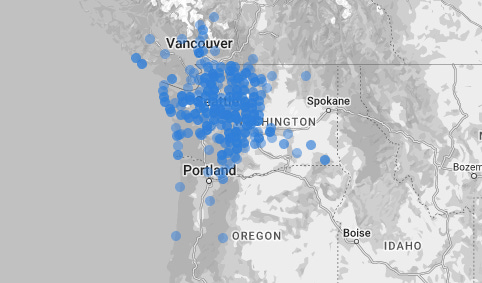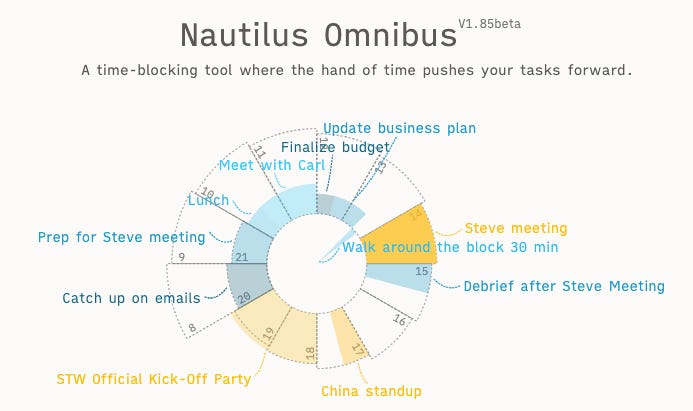Personal Science Week -240815 Personal Scientists
Examples of ordinary people doing science
There are many ways to do personal science.
This week we’ll look at several recent examples of normal people doing personal science.
Personal Scientist: Zenobase
Update from PSWeek 240725: Eric Jain shared his results from the Tastermonial Apple Cider Vinegar trial. Like me, he didn’t find much evidence that it changed his glucose levels, though the data is noisy. Tastermonial tested many others, though, so I’ll be interested to know if there are some people who get an obvious boost.
An avid hiker and long-time self-tracker, Eric operates the excellent self-tracking web app Zenobase, where he keeps a decade of his own information, including a map of all his hiking trips.
Create a free account, upload your own data (from just about any source you can imagine) and do all the types of statistics and cross-correlations you’d expect from a site built by a long-time personal scientist.
Personal Scientist: DIY Bio
Sebastian Cocioba, co-founder of Bionomica Labs, proudly calls himself an “amateur scientist”. Despite his lack of an undergraduate degree, he’s taught himself over the past 15 years to build a functional bio laboratory in his house.
Read his open source Potions and Recipes details for how to genetically engineer your own flowers. He makes everything from air-purifying houseplants to creating the world’s first genetically modified Olympic mascot.
His lab is made of second-hand equipment, including an Opentrons robot and a JG1000 Chinese knockoff of a PDS1000 gene gun.
Join his Petalsmiths group on Facebook. Read more at Asimov Press
Personal Scientist: Productivity Planning
Tomáš Baránek task-based calendar planner
In most calendaring apps, tasks and events are separate. You’re expected to check off your tasks throughout the day by just … magically finishing them somehow in your spare time. You can of course block out periods of time to get your work done, but you need to be purposeful about that. It’s easy to let distractions get in the way and force you to postpone the task.
Tomáš has a neat online app that helps solve this. You just enter your tasks for the day, along with an estimate of how much time will be needed. Copy/paste your iCalendar events and the app generates a nice plot showing your day’s schedule along with how much leftover time you’ll have.
Here’s a typical way I write up my text for the day:
China standup 5:00 PM to 5:30 PM
Steve meeting 2pm - 3pm
Debrief after Steve Meeting 30min
STW Official Kick-Off Party 6:00 PM to 8:00 PM
Catch up on emails 60min
Prep for Steve meeting 60min
Lunch 30min
Meet with Carl 90min
Finalize budget 30min
Update business plan 60min
Walk around the block 30 min
which Nautilus converts into this:
Try it out at https://nautilus-omnibus.web.app/
Personal Scientist: Web Surf Tracking
Bret Bernhoft shares his collection of self-quantification software including a new YouTube Playlists Tracker App. He’s written a collection of simple Python scripts that let you pull data from a website and visualize it with pretty graphs.
A Boring Study on Wearables
Rock Health commissions an annual study of wearables and their users. The latest one was published Journal of Medical Internet Research. Of the demographically-matched 20K+ people they surveyed from 2020-2022, about 45% were using a wearable.
The rest of the study is, um, just not very interesting. The big takeaway: Wearable owners tend to be wealthier, more educated, and more urban than average! Surprise!
Rather than obsess about these demographics, wouldn’t it be better to learn:
What did you learn from your wearable?
Will you continue using it, and why?
Are you likely to recommend to a friend or family member?
We wrote a much more interesting “report” on wearables back in PSWeek231116
About Personal Science
If you prefer to do your own research rather than blindly trust credentialed experts, you might be a personal scientist. Unless, that is, you treat unskeptically whatever new claim you read. Personal scientists are both open-minded and skeptical.
We publish each Thursday a few thoughts and summaries we think are useful to anyone who aspires to use the tools of science for personal, rather than professional reasons. Paid subscribers can read our Unpopular Science series, including this week’s post on misinformation
If you have other topics you’d like to discuss, please let us know.





Thanks for the shout-out 😀